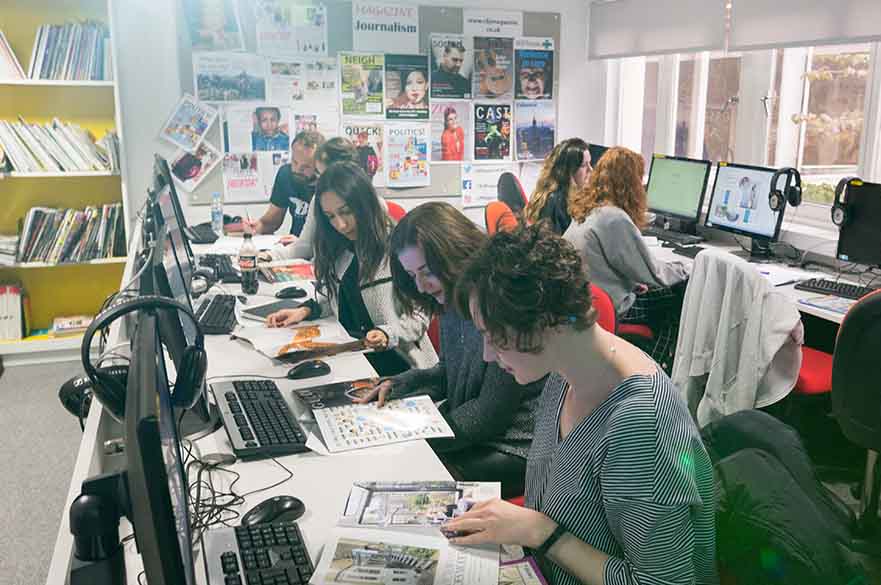Sports Journalism MA
About this course
Get ready to dive headfirst into the exhilarating realm of sports journalism.
Imagine yourself right in the action, crafting stories that resonate across all media platforms – from thrilling broadcasts to engaging digital content and impactful written pieces.
Get set to explore how sports coverage is driven by data insights and fuelled by the dynamics of social media, playing a pivotal role in the success of major media brands.
You could be scoring interviews with top athletes, delivering live commentary on the side-lines, breaking down strategic plays, and placing sports within the larger context of history and society.
You will unleash your creative flair in the UK's biggest student newsroom, with access to state-of-the-art TV studios, cutting-edge radio and podcast setups, and the latest industry-standard tools for production and design.
And where better to kick-start this thrilling journey than Nottingham, the ultimate city of sport? Immerse yourself in Premier League football, international cricket, tennis showdowns, ice hockey face-offs, and so much more. With iconic venues like the National Ice Arena, Trent Bridge Cricket Ground, and the National Water Sports Centre, Nottingham is the ultimate playground for honing your sports journalism prowess.
Industry recognition

We are proud to be part of the BAFTA Albert education partnership

This course is accredited by the National Council for the Training of Journalists (NCTJ)
NCTJ Diploma
Students on this course also work towards their NCTJ Diploma.
You will study the diploma’s mandatory elements as part of your core modules. You will also study 35 credits worth of elective elements, which will vary depending on your core and optional modules, but may include:
- Sports journalism
- Shorthand for journalist
- Videojournalism for digital platforms
- Media law court reporting
- Journalism for a digital audience
- Data journalism
What you’ll study
-
Core modules
Sports Journalism Production (40 credit points)
Embark on a transformative journey into multiplatform sports journalism. This module hones career-driven skills essential for writing, digital, and broadcast media. Dive into research, interviews, and broadcasting techniques to develop your technical prowess with audio, video, and editing. Discover the power of social media and ethical journalism and craft impactful content for diverse platforms, from print to online. You will be identifying compelling stories, operating studios, and shaping news narratives, whilst real-world placements and practical experiences drive your growth as a journalist. This module also includes a reflective blog, assessing your readiness for the dynamic industry.
Social Media and Audience Analytics (20 credit points)
Get ready for a captivating module with dual themes. Explore the dynamic realm of social media's impact on journalism and society through critical discourse, drawing from journalism research, media studies, and ethics. Uncover practical tools to craft compelling social media content, backed by audience analytics to elevate your critical thinking, questioning, and creative prowess.
Sport: Challenges and Controversy (20 credit points)
Can you ever leave the politics out of sport? This module explores the development of sport through a series of themes to help you understand the origins today’s global sporting world – and prepare you to cover it. Themes include class, race, gender, sustainability, decolonisation, disability, commerce and celebrity.
Questions you might consider on this module include:
- Why do overseas consortia keep buying high profile English football teams?
- Why do world class female athletes earn less than their male counterparts?
- Is it time to allow all athletes to use performance enhancing drugs?
- Should sport governing bodies be allowed to govern athlete’s bodies with arbitrary gender-identity rules?
- Is the Olympics the pinnacle of our shared human experience… or a cynical money-making corporate venture?
- Can multi-billion-dollar sporting competitions ever be green?
As sports journalists you’ll spend as much of your time reporting on the challenges and controversies surrounding sport as you will the on-pitch action. This module will help you understand the issues you might cover on day one of your job.
Media Law and Ethics (20 credit points)
Enter the dynamic world of media law to grasp its impact and scope. You will acquire the essential professional compliance skills and practical know-how to allow you to navigate areas like defamation, privacy, and copyright. Develop critical understanding of key legal principles for various journalistic platforms and gain practical skills in recognizing publication risks and amending content. Explore the effects of reporting restrictions on journalism to elevate your legal awareness and excel in the media landscape.
Sports Journalism Project (60 credit points)
Embark on the capstone module, showcasing your mastery in journalism or research. Tailor your assessment, whether delving deep into industry dynamics, crafting compelling storytelling, or collaborating on group projects. Explore cutting-edge techniques with a supportive supervisor, engaging in personalized sessions. Your assessment includes a plan, journalistic output, critical commentary, and industry presentation. Choose from:
- The Negotiated Dissertation: Unearth industry insights through research, culminating in an 8,000-10,000 word dissertation.
- The Individual Negotiated Project: Craft long-form storytelling across mediums, shaping a TV film, radio show, or multimedia feature.
- The Group Negotiated Project: Collaborate on a shared topic, creating diverse outputs while retaining individual reflections.
- The Negotiated Work-Based Learning Project: Partner with industry experts, moulding your project to real-world demands.
Choose one
Data-driven Investigations (20 credit points)
Discover data-led investigative projects in journalism. Explore the fusion of industry practice and theoretical discourse to gauge the impact of data journalism on society. Uncover new digital methods to power your research and enhance your multiplatform storytelling abilities. Delve into the world of open data and alternative sources of information. Gain the skills to analyse, understand, and interpret statistical data for your news audience. Create compelling journalistic content from data-driven insights.
Podcasting Production (20 credit points)
Immerse in podcasting's dynamics: theory, production, and impact. Master skills for crafting professional podcasts. Explore the intersection of traditional audio with contemporary journalism, while you probe popular narratives, context, and economics. Learn from experts, grasp the podcasting landscape, and hone your podcasting prowess.
Exploring Promotional Cultures (20 credit points)
Explore cross-cultural PR and content creation. Acquire coveted modern communication skills while learning from diverse alumni guest speakers. Embrace teamwork, devising roles for clarity and commitment in industry-relevant group projects.
We regularly review and update our course content based on student and employer feedback, ensuring that all of our courses remain current and relevant. This may result in changes to module content or module availability in future years.
How you're taught
Study methods and assessment
Study methods include practical sessions, research, lectures, seminars, workshops and professional practice. Learn from your peers, and guest speakers.
Assessment is by a mixture of portfolio work, projects, essays, and exams.
Work experience
Get ready for hands-on learning that's at the very core of this program. Whether in core or optional modules, the practical aspect immerses you in real journalistic work, making you think and act like a pro.
Picture yourself in the action of over fifteen vibrant NewsDays, where you'll whip up content for our public platforms – websites and social media. Some of these days are even guided by graduates working in the industry. This isn't just a simulation; it's a genuine industry warm-up that blends perfectly with the standards set by the National Council for the Training of Journalists (NCTJ) and the Broadcast Journalism Training Council (BJTC).
And when it's time for your capstone project, let your creativity take the lead. Choose your own adventure, shaping your skills and knowledge into a major piece of work that will interest future employers. In some cases, potential employers might even pitch in with live briefs for your capstone projects. And for those aiming for research-focused careers, fret not – we're keeping the theoretical option alive and well.
But that's not all. We believe in getting you out there to gain some serious experience. You'll spend a minimum of fifteen days on the job, mingling with various organizations and businesses – from your local area to a global stage. It's your chance to learn, network, and shine in the journalism world.
Professional practice
Students are encouraged to work to professional standards and are expected to be punctual, meet deadlines, work in teams and contribute ideas.
Learn a new language
Alongside your study, you also have the opportunity to learn another new language. The University Language Programme (ULP) is available to all students and gives you the option of learning a totally new language or improving the skills you already have. Learning a new language can enhance your communication skills, enrich your experience when travelling abroad and boost your career prospects. Find out more about the University Language Programme.
Careers and employability
Your career development
Graduates will work as sports journalists for regional, national and international sports journalism brands such as the BBC, ITV, Sky Sports, The Athletic, BT Sport and Reach. They will also move into other areas of the media, including digital marketing and PR, content creation for sporting organisations and event/stadium hosts for live sporting events.
Campus and facilities
Our award-winning range of journalism courses is based in the Centre for Broadcasting & Journalism, centrally placed on our City Campus. This multi-million-pound development includes one of the largest student newsrooms in the UK, a fully functioning TV studio with production facilities and three radio studios. Find out more ...
Entry requirements
UK students
Academic entry requirements: 2.1 honours degree and enthusiasm for, or experience of journalism.
Applicants with a 2.2 and substantial experience will be considered.
Applications from candidates with non-standard entry qualifications will be considered on an individual basis if they can demonstrate relevant professional experience.
Other requirements: All journalism applicants will be asked to submit a written piece as part of their application. View written test. This will be judged against clear criteria. When assessing sample writing manuscripts we are looking for work of at least a satisfactory (pass) standard in terms of language, content, observation, structure and voice.
Additional requirements for UK students
There are no additional requirements for this course.
Other qualifications and experience
We welcome applications from students with non-standard qualifications and learning backgrounds and work experience. We consider credit transfer, vocational and professional qualifications, and any work or life experience you may have.
You can view our Recognition of Prior Learning and Credit Transfer Policy which outlines the process and options available, such as recognising experiential learning and credit transfer.
Getting in touch
If you need more help or information, get in touch through our enquiry form.
International students
Academic entry requirements: 2.1 honours degree and enthusiasm for, or experience of journalism.
Applicants with a 2.2 and substantial experience will be considered.
We accept equivalent qualifications from all over the world. Please check your international entry requirements by country.
Other requirements: All journalism applicants will be asked to submit a written piece as part of their application. View written test. This will be judged against clear criteria. When assessing sample writing manuscripts we are looking for work of at least a satisfactory (pass) standard in terms of language, content, observation, structure and voice.
English language requirements: See our English language requirements page for requirements for your subject and information on alternative tests and Pre-sessional English.
Additional requirements for international students
If you need help achieving the academic entry requirements, we offer a Pre-Masters course for this degree. The course is offered through our partner Nottingham Trent International College (NTIC) based on our City campus.
English language requirements
View our English language requirements for all courses, including alternative English language tests and country qualifications accepted by the University.
If you need help achieving the language requirements, we offer a Pre-Sessional English for Academic Purposes course on our City campus which is an intensive preparation course for academic study at NTU.
Other qualifications and experience
We welcome applications from students with non-standard qualifications and learning backgrounds and work experience. We consider credit transfer, vocational and professional qualifications, and any work or life experience you may have.
You can view our Recognition of Prior Learning and Credit Transfer Policy which outlines the process and options available, such as recognising experiential learning and credit transfer.
Sign up for emails
Sign up to receive regular emails from the International Office. You'll hear about our news, scholarships and any upcoming events in your country with our expert regional teams.
Getting in touch
If you need advice about studying at NTU as an international student or how to apply, our international webpages are a great place to start. If you have any questions about your study options, your international qualifications, experience, grades or other results, please get in touch through our enquiry form. Our international teams are highly experienced in answering queries from students all over the world.
Policies
We strive to make our admissions procedures as fair and clear as possible. To find out more about how we make offers, visit our admissions policies page.









